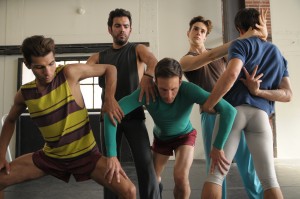By Chris Mason Johnson
I don’t have any statistics on this, but from what I can gather anecdotally, forming a non-profit to make a fictional feature film is a pretty rare thing, but it’s what I’ve done for my new (second) feature, Test, and it’s been a great experience. Mostly great. At first I did have to endure snarky questions from my non-filmmaking friends, along the lines of: “Aren’t you just admitting your film won’t make any money?” Well, no… (more on that later). From my filmmaking friends the response was more of a blank stare, followed by: “I don’t know anyone else who’s done that.”
There are a lot of filmmakers out there who make one feature and then stop. They didn’t break through to that magical “next level,” and there’s no way they’re doing the same thing all over again. But for those of us who are determined to keep making films on a small scale, truly independently — and who actually enjoy it — it makes sense to explore new models in a distribution landscape that’s in the midst of its own creative destruction and reconfiguring.

Maybe there are filmmakers out there like me who had some very modest success with a first feature — you sold it to a small distributor and/or cable, you got it on Netflix, you made a few foreign sales — and you want to do it again. But you also want to retain creative power and control. Doing that means thinking small, as in small budgets and a realistic business (or non-profit) model.
What I’m talking about here is an ultra-low-budget feature without stars, made for, say, 200 to 300K. The kind of movie that may do a two-week theatrical in select cities but then lives mostly on the internet and cable. It’s seems to me that the ontology of a film like that is a lot closer to other projects that use non-profits — e.g., documentary films, dance companies, off-Broadway productions — than it is to a large-scale independent film with stars and a budget in the millions, let alone to a Hollywood production.
A non-profit isn’t right for all projects, obviously. Comedies without any socially relevant/meaningful content, for example, wouldn’t make sense. And yes, you do need to prove “educational value” to the IRS. The non-profit I’ve created, Serious Productions, Inc., will have a life beyond Test and has a broader mission statement that Test fits into: to capture aspects of LGBT lives and experience that might otherwise be lost in the bigger historical narratives that dominate. Test is set in 1985 San Francisco, and takes a very personal look at young dancers caught up in the early days of the AIDS epidemic. It’s a story that hasn’t been told and might be lost if it isn’t.

After Test has finished its festival, theatrical and initial VOD runs (fingers crossed!), my non-profit will still exist and can become an incubator for future material and a means to cultivate future collaborators. I can imagine projects under the non-profit rubric (oral histories, video portraits) that keep me working and generating material in between the long span that inevitably separates feature films these days, and these projects can, in turn, generate material for those future features.
So I’ve probably raised more questions than I’ve answered, but here’s a list, in no particular order, of what I’ve liked about forming a non-profit. Maybe there are some answers embedded in here:
– You can still pay yourself a fee as a writer/director/producer/editor, etc., and you can of course still pay everyone who works for you.
– You can still form an LLC for those investors who really want to invest rather than donate (bless them!). I have an LLC for TEST, and about 25% of my budget comes from private equity investment.
– Actual investors will recoup much faster, because the grants and donations don’t need to recoup.
– Fewer K-1s to send out at tax time!
– Your non-profit can buy units in your LLC, so that some money recoups to the non-profit for overhead. This gets tricky; talk to a lawyer.
– You don’t need to set up Fiscal Sponsorship in order to apply for grants or accept donations — you are your own 501-c-3 — and you don’t lose the 5-7% cut that a fiscal sponsor takes.
– The world of grants for fictional features is small, but it’s a great world and great to explore, full of people who care about movies and content. The San Francisco Film Society is one organization that’s granted me on Test (via the Kenneth Rainin Foundation) and they’ve been an amazing partner on the project.
– Beyond actual grants, there is also a whole world of foundations out there that are basically set up by wealthy individuals who need to write off money for tax purposes. Some of these people love independent film!
– Anyone can give you a tax-deductible donation; you are not limited to grants and foundations.
– If you do a Kickstarter campaign, you can offer your donors a tax deduction via your 501-c-3, something that Kickstarter itself cannot do.
– Fundraising is more emotionally rewarding! When people are donating rather than investing, because they care about the material in a different way, the whole vibe is different. To me, the relationship feels less cynical and more genuine.
A final word: you can’t do any of this without a good lawyer who already understands the non-profit landscape, preferably from working with documentary filmmakers. Also, you can’t fake it. Your content really does have to be serious.
Editor’s Note: As with any legal matter, if you are interested in considering this model, you should consult with your lawyer. The views here opinion only, and should not be a substitute for legal opinion.
This post originally ran on the San Francisco Film Society’s blog here.
Chris Mason Johnson’s first feature as writer/director is The New Twenty (2009); his second, Test, is currently in post-production. Prior to filmmaking, Chris worked in independent film development and prior to that was a dancer in major ballet and modern companies in the U.S. and Europe. He is currently a resident at the San Francisco Film Society’s Film House.





